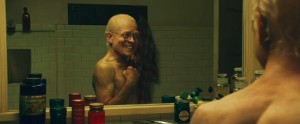Over the Christmas holidays, I saw two films that dealt with the meaning of life…or rather the meaning of life for two distinct individuals. Both The Curious Case of Benjamin Button and Slumdog Millionaire involve two characters looking back over significant events in their lives. Both films, to an extent, rely on gimmicks: the former, an individual who ages in reverse and the latter, a child of the slums who strikes it unbelievably rich on the world famous game show, Who Wants to Be a Millionaire?. Here’s a review of The Curious Case…check back later for more on Slumdog.
The Curious Case of Benjamin Button, directed by David Fincher, is about a man, Benjamin Button (Brad Pitt), who is born as an elderly infant. He is the size of a new-born baby, but has the physical conditions of someone well on their way to the grave. His mother dies in childbirth, and his father, in a panic, rushes out into the streets of New Orleans and leaves Benjamin on the doorstep of, appropriately, a nursing home. Recognizing Benjamin as creation of God, the caretaker, Queenie (Taraji P. Henson), takes him in and raises him as her own. Expecting him to die at any moment, everyone surrounding him is shocked to see that, rather than dying, Benjamin is actually living…and getting younger at that. Growing restless confined in the nursing home, at around the age of seventeen, but still with the body of an older man, Benjamin sets out to see the world by working on a tugboat. He visits ports as far away as Russia where he meets and falls in love with Elizabeth Abbott (Tilda Swinton), a woman married to a British ambassador there. Just as that relationship ends, Benjamin’s tug boat is conscripted into the war. When on a run to salvage broken down or destroyed vessels, his boat is attacked, and Benjamin barely makes it out alive, losing some of his closest friends in the process.
 Benjamin returns to New Orleans and falls back in love with a childhood sweetheart, Daisy (Cate Blanchett). Having moved on with her life, Daisy is now a world-famous ballet dancer who is much too busy for a relationship with Benjamin. When she suffers a tragic accident, he tries to help her, but she resists. Eventually, Daisy returns to New Orleans and to Benjamin, and they begin a life together and have a child. Benjamin soon realizes that as he ages backwards he will not be a suitable father for their daughter Caroline (played as an adult by Julia Ormond). He again leaves only to see Daisy once more before he forgets her forever. A few years later, the police and child services contact Daisy because they have found a young boy who claims that he knows her. She returns to the nursing home where Benjamin was raised to find a dirty adolescent boy plagued by dementia. She cares for him as he declines, forgetting how to talk and walk, until he dies.
Benjamin returns to New Orleans and falls back in love with a childhood sweetheart, Daisy (Cate Blanchett). Having moved on with her life, Daisy is now a world-famous ballet dancer who is much too busy for a relationship with Benjamin. When she suffers a tragic accident, he tries to help her, but she resists. Eventually, Daisy returns to New Orleans and to Benjamin, and they begin a life together and have a child. Benjamin soon realizes that as he ages backwards he will not be a suitable father for their daughter Caroline (played as an adult by Julia Ormond). He again leaves only to see Daisy once more before he forgets her forever. A few years later, the police and child services contact Daisy because they have found a young boy who claims that he knows her. She returns to the nursing home where Benjamin was raised to find a dirty adolescent boy plagued by dementia. She cares for him as he declines, forgetting how to talk and walk, until he dies.
The Curious Case of Benjamin Button could have simply been about, well, the curious case of its title character. The special effects that the filmmakers used to render Benjamin’s process of reverse aging work wonderfully and never once seem out of place. However, if you look closely enough you can see the CG at work in the eyes as the old/young Benjamin blinks. Nevertheless, the “shock” of an elderly infant quickly wears off, and the CG begins to serve the plot rather than distracting from it. Rather than just telling the story of Benjamin Button, the filmmakers use his curious case to say something about living, loving, and understanding it all, but from yet another perspective.
 The curious case in the film is just as much about Daisy as it is Benjamin. The film opens in a Louisiana hospital during Hurricane Katrina, and as the storm rages outside, we find Daisy on her deathbed. To help take her mind off the pain, she asks her daughter to read from a diary that she has kept with her all these years but has been unable to read. As Caroline reads, we quickly realize that this is Benjamin’s diary, and Daisy learns things about his life, and her own, that she did not know until now. Daisy begins to make sense of events in her life, to deal with unrequited love, both Benjamin’s and her own. In the process, Caroline also realizes that Benjamin was actually her father. Because Benjamin still lived his life in a linear fashion, moving forward while aging backward, he was still bound to a perspective that became more confining as he “got younger.” His infantilization robbed him of any ability to reflect on his life and to make any sense of all that he had experienced. Daisy, on the other hand, even as she is riddled by what must be cancer, has the opportunity, through the reading of Benjamin’s diary, to understand her life in reverse. Though her love for Benjamin came in fits and starts during their life together, it grows richer still on her deathbed with each new revelation.
The curious case in the film is just as much about Daisy as it is Benjamin. The film opens in a Louisiana hospital during Hurricane Katrina, and as the storm rages outside, we find Daisy on her deathbed. To help take her mind off the pain, she asks her daughter to read from a diary that she has kept with her all these years but has been unable to read. As Caroline reads, we quickly realize that this is Benjamin’s diary, and Daisy learns things about his life, and her own, that she did not know until now. Daisy begins to make sense of events in her life, to deal with unrequited love, both Benjamin’s and her own. In the process, Caroline also realizes that Benjamin was actually her father. Because Benjamin still lived his life in a linear fashion, moving forward while aging backward, he was still bound to a perspective that became more confining as he “got younger.” His infantilization robbed him of any ability to reflect on his life and to make any sense of all that he had experienced. Daisy, on the other hand, even as she is riddled by what must be cancer, has the opportunity, through the reading of Benjamin’s diary, to understand her life in reverse. Though her love for Benjamin came in fits and starts during their life together, it grows richer still on her deathbed with each new revelation.
Daisy’s pained, brief narrations of her own life are compelling and heartbreaking, especially as she tells of her decision to care for the young/old Benjamin. We see them walking side by side, she an aging woman, he a stumbling infant who has forgotten how to talk, much less the identity of the woman leading him. Daisy rocks Benjamin as an infant and tells us that she once saw a flicker of recognition in his young eyes. As the story progressed, I was reminded of an earlier film, 2004’s Birth, which starred Nicole Kidman as a woman who believed that the spirit of her husband was reincarnated in the body of a young boy. There was some scandal over the film’s sexuality (Kidman and the young boy in a tub together, naked). Birth could not really accomplish much in the way of saying anything about love because it could never convince the audience, or the other characters, that Kidman was anything more than crazy or perverted. The Curious Case of Benjamin Button succeeds marvelously because we know that Benjamin has aged backwards and that there really is an old man inside the young child’s body. The more recent film succeeds because it avoids any controversial, sexual encounters once Benjamin surpasses his teenage years. Daisy does all that she can do in her difficult situation, caring for the man that she once loved, even though he is beyond recognition.
The Curious Case of Benjamin Button is a very direct visualization of the old saying, “Once a man, twice a child.” Yet since it was about much more than this, it succeeds when it might have easily failed. Its encouragement to live life to the fullest and to be prepared for whatever comes your way is a welcome message, if somewhat trite. Yet Blanchett’s performance and the significance of her character’s experiences are much weightier and make the film a must see, well after the special effects have worn off.
The Curious Case of Benjaming Button (159 mins.) is rated PG-13 for brief war violence, sexual content, and brief offensive language.











